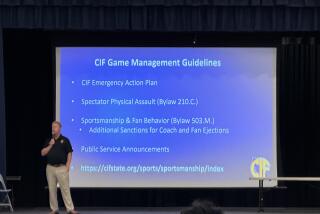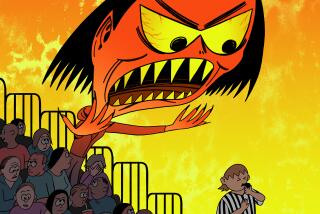Civility 101 for Sporty Parents
- Share via
WASHINGTON — Fed up with bad behavior in the stands, some youth sports leaders are requiring parents to get training in sportsmanship.
It’s an attempt to suppress outbursts that have ranged from berating referees, coaches and even the parent’s own kids to joining in full-fledged brawls on the field.
“We all live through our kids, whether we think so or not, and therefore we do some very strange things,” said Fred Engh, president of the National Alliance for Youth Sports in West Palm Beach, Fla., an organization of coaches, sports officials and parents in varied sports.
Pressure to win at all costs is taking the joy out of youth sports, Engh said. The anxiety increases as organizations lose track of the value of simply having kids play. Youth leagues are modeling themselves after high-stakes pro teams and making the championship game the point of the season, he said.
And parents are approaching their children’s leagues with the same venom that adults show at pro sports, where stadiums are being built with holding cells, Engh said.
“Because sports are so popular in our society, it’s anathema for us to think our child will sit in the dugout,” he said. “We desperately have to have our child be the star.”
Game tension, coupled with parents’ seeming lack of understanding of how to control themselves, can turn a kids’ game into a pressure cooker, Engh said. So his organization has developed a method to teach parents, among other things, self-control.
The Parents Assn. for Youth Sports program is being tested before being launched to national alliance affiliates, said Kathleen Avitt, the parents association’s national program director.
The new program is an upgrade from the current method of having a coach talk with parents and give them educational material, Avitt said. Parents will join the association, take training and possibly face being discharged from membership if they fail to meet standards. “We are trying to hold them responsible for their actions,” she said.
In addition to meeting with coaches, parents will view a video, receive a handbook, wear buttons that promote sportsmanship and sign a code of ethics, Avitt said.
Among the handbook’s advice: “Make only positive, encouraging comments to the players on both teams. Remember, making mistakes is part of the learning process --don’t criticize.”
Among the points in the code of ethics: “I will place the emotional and physical well-being of my child ahead of a personal desire to win. I will remember that the game is for youth--not for adults.”
Other organizations also target parental behavior, although they do not go so far as to require membership in an additional organization.
As far as he knows, no other youth sports group would require parents to join a separate organization that allows the possibility of being dismissed from membership for bad behavior, said Jon Butler, executive director of the Pop Warner football national organization in Langhorne, Pa.
Pop Warner lets its individual league handle parental education in sportsmanship, Butler said.
Butler was dubious about the value of having parents join an organization that is not one in which their children play. The parents’ bottom line is whether their children are in the game, so the possibility of disciplining parents through an auxiliary group may not be that big a threat, he said.
At the American Youth Soccer Organization, team officials start educating parents of children in the under-6 and under-8 leagues, said Doug Semark, director of education at the group’s Hawthorne, Calif., headquarters.
Among the tools is a parent’s code that tells parents they “are not participants on their child’s team.” It advises them: “Support all efforts to remove verbal and physical abuse from youth sporting activities.”
How to handle issues of sportsmanship is left up to the organization’s regions, spokeswoman Amy Williams said. She has heard of officials requiring parents to sign the code.
But the soccer organization does not see a need for separate parental education, Semark said. Coaches, referees and other officials are trained in how to defuse confrontations involving parents, he said. And sportsmanship should be taught as part of the entire sports experience, not in isolation, he said.
More to Read
Go beyond the scoreboard
Get the latest on L.A.'s teams in the daily Sports Report newsletter.
You may occasionally receive promotional content from the Los Angeles Times.










